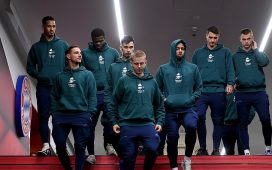NICE, France — Caroline Graham Hansen and Ada Hegerberg went through most of their early rites of passage together. In 2009 in Salangen, they played together in Norway’s national colors for the first time for the under-15s.
A few months later, they were both in the changing room during a game against Germany. Norway was losing, 2-0; most of their teammates felt, given the strength of their opponent, that was not too bad. Hansen and Hegerberg made clear that they saw it differently. “They always went on the field with zero respect,” said Guro Reiten, the captain of that team.
At age 17, Hegerberg and Hansen won the Norwegian Cup together with Stabaek: Hegerberg scored three goals in a 4-0 win, Hansen had the fourth. They played for Norway’s under-19s together, when Hegerberg was 15 and Hansen 16, and a year later for the under-20s. They made their senior international debuts a few days apart.
[Sign up for Rory Smith’s world soccer newsletter, delivered every Friday.]
Both were seen as the standard-bearers for a new generation. “The hopes were similar,” said Trond Johannessen, a reporter for the Norwegian outlet VG. “In a way, Hansen was the bigger prospect, though she was never as clinical a goal-scorer as Hegerberg.”
Together, they carried Norway to the final of the 2013 European Championship, defeated at the last step by Germany. They made the moves that would define their club careers — Hegerberg to Olympique Lyonnais, Hansen to Wolfsburg — a year later, in the same summer.
Only then did their paths begin to diverge, setting them on the road that brings them to Thursday night. Hegerberg joined Lyon, the dominant force in women’s soccer, and won the Champions League four times, and then the first women’s Ballon d’Or. Hansen picked up countless trophies in Germany, too, but, too often, she was struck by injury. Hegerberg became women’s soccer’s biggest star; Hansen, for a while, its biggest question mark.
Hegerberg, angered by the uneven treatment of men’s and women’s players by Norway’s soccer authorities, walked away from the national team, a potent, deeply personal statement. Hansen stuck with it, maintaining that representing her country was “the biggest honor” she could envisage.
The buildup to Norway’s campaign in France was dominated by Hegerberg’s absence, and incessant demands that she explain the reasons for her decision. Over the last two weeks, though, once the tournament actually started, as Norway progressed through the group stage and squeezed past Australia to set up a quarterfinal against England on Thursday, it has become increasingly clear that the team is defined by Hansen’s presence.
Not that Hansen, 24, would interpret it that way. She has a studied collectivism, a refusal to bend from her insistence that all that matters is the team. After the first two games of the tournament, she dismissed queries about her own form, repeating instead that it was irrelevant how an individual played if the team was thriving.
It is a mind-set that has been inculcated in all of Norway’s players, in part as a response to the country’s dismal performance at the 2017 European Championships, when it was eliminated in the group stage without garnering a point. It was that disappointment that forced Hegerberg’s hand, that convinced her that the women’s team was being held back by a lack of support from the authorities. For others, the root cause of the problem was different.
Martin Sjogren, appointed as Norway’s coach earlier that year, had tried to instill a sense of unity in his players; when he first met them, he told them, “We is always stronger than I.” Jan-Ove Nystuen, the Norwegian soccer federation’s head of brand, picked up on that message and mixed it with a little inspiration from Muhammad Ali: “Me? We.”
The slogan “sterkere sammen” — “stronger together” — was adopted, and the players were encouraged not only to plaster it on their Instagram posts, but also to use it as a rule for life. It would, in time, spread from the women’s team to the men’s. “It was their way of fighting back after the Euros,” Johannessen said.
It is easy to wonder if, perhaps, the focus on Hegerberg has helped foster that same sense of duty, whether those that remain are intent on proving they can shine even without their country’s brightest light. Hegerberg and Hansen did not speak for some time after the former’s decision to leave the national team; there was a minor controversy when it emerged Hegerberg had dropped many of her former teammates as friends on Facebook.
Sjogren has encouraged the players to take responsibility for their performances. There are regular meetings before training sessions, for example, with the squad asked to set out their goals for the coming hour. Afterward, they will debrief, to assess whether they feel they lived up to their expectations, and to consider how things might be improved.
There is a “captaincy group” within the squad — Maren Mjelde, Ingrid Moe Wold and Hansen — that functions not only as a bridge between the coaching staff and the players, but also take responsibility for the way the players perform.
Over the last two years, that group has sought advice from Liv Hemmestad, a performance coach who has worked with Norway’s handball and cross-country skiing teams, to establish how to draw the best from their teammates. There have been regular meetings of the playing squad during the World Cup, an acknowledgment that different players will be experiencing the tournament in different ways.
It is a leadership role — quiet, collective — that suits Hansen. “It is important for her to succeed personally,” Johannessen said. “We can see that. We just cannot hear it.” Hansen does not talk about herself, but that is not to say that she does not feel any responsibility to perform to her best. “She could have acted like a big star, but she does not want to do that. And that is also a way of leading,” he said.
Her example, though, is potent. Hansen has been “tremendous” in France so far, Sjogren has said. Emma Hayes, the Chelsea coach, has singled her out as the greatest threat to England’s hopes of reaching the semifinal. It has been clear why, at the end of the tournament, she will leave Wolfsburg for Barcelona. The knee injuries that stalled her career just as Hegerberg’s was blossoming have cleared up; she is making up for what time she has lost.
The quarterfinal is yet another milestone in Hansen’s career; it may be the game that announces her to the world at large as the top-tier talent Norway first saw all those years ago. Hegerberg was with her then. In her absence, now, Hansen has the chance to prove that she belongs, just as she used to be, side by side with the best player in the world.








